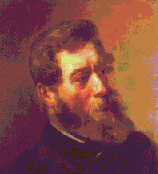By Ludwig von Feuerbach

Ludwig von Feuerbach
German philosopher and moralist, chiefly remembered for his influence on the young Karl Marx and for his systematically materialistic worldview. Feuerbach began with theological studies, but abandoned them to study metaphysics under Hegel for two years at Berlin. His first book, Gedanken �ber Tod und Unsterblichkeit (�Thoughts on Death and Immortality� 1830), attacked the idea of personal immortality and proposed instead an evolutionary notion of immortality, whereby human qualities are re-absorbed into nature. His vigorously anti-religious views were further developed in �ber Philosophie und Christentum (1839; �On Philosophy and Christianity�), with the claim that Christianity has no part of the rational life of progressive mankind, and remains nothing more than an outdated �fixed idea.�
Feuerbach's rationalist rejection of religion emerges most trenchantly in Das Wesen des Christentums (The Essence of Christianity, 1841), holding that man is his own highest object of thought and that religion is no more than a generalised awareness of the infinite; �God� is merely the outward projection of man's inner nature.
The first half of his book, which drew young Karl Marx into atheism, purports to expound the �anthropological essence of religion.� Discussing our notions of God as a �being of the understanding,� as a �moral being or law,� as �self-transcending love,� etc., Feuerbach argues that these are merely the projections of different needs in human nature. The second half attacks what he calls the �false or theological essence of religion.� The idea that God has a real existence independent of human beings is linked to a belief in revelation and sacraments, which Feuerbach rejected as a naive religiosity. Having attacked the "dogmatic illiberalism" of Catholicism, he similarly savages the "believing unbelief" of Protestantism, which "opposes the biblical dicta to dogmatic definitions, in order that it may set itself free from the limits of dogma by arbitrary exegesis;" both must yield to his thoroughgoing rationalism. He sees a radical contradiction between Faith and Love since, in his mind, faith sets artificial limits to the range of those whom one should love. In brief, Feuerbach dismisses the God of orthodox Christianity as an illusion.
Extending his reflections to philosophy, he poured scorn on Hegel's principles as quasi-religious and adopted radical materialism instead. For his attacking religious orthodoxy, Feuerbach was hailed as a hero by many of the revolutionaries during the politically turbulent years of 1848�49. His influence was strong on such skeptical writers as David Friedrich Strauss, author of The Life of Jesus Critically Examined, and Bruno Bauer, who, like Feuerbach, abandoned Hegelianism for naturalism. Feuerbach's anti-religious views were later adopted by the Kulturkampf, the bitter struggle between church and state in the Germanic lands and by those who, like Marx, promoted the revolt of labour against capitalism.
